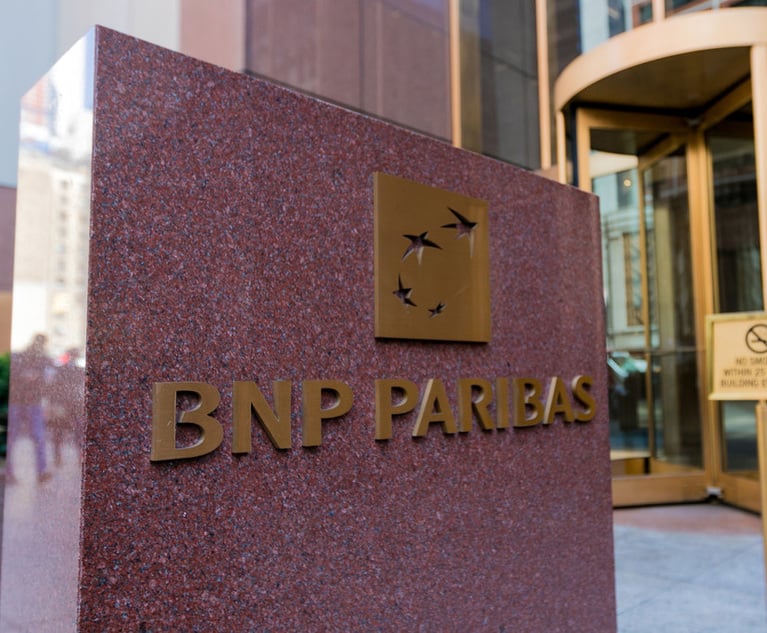Germany Tightens Rules on Foreign Investments. What Are the Implications?
Anahita Thoms writes that on July 12, Germany tightened its control over acquisitions of domestic companies by foreign investors by introducing amendments to the Foreign Trade and Payments Ordinance. As a result the German Federal Ministry for Economic Affairs and Energy can now block certain acquisitions more easily based on security reasons, which aligns Germany more closely to the regime in the United States.
September 27, 2017 at 02:03 PM
6 minute read
On July 12, 2017, Germany tightened its control over acquisitions of domestic companies by foreign investors by introducing amendments to the Foreign Trade and Payments Ordinance (the Ordinance). As a result the German Federal Ministry for Economic Affairs and Energy (the Ministry) can now block certain acquisitions more easily based on security reasons.
The change in the law was the result of the German federal government's reaction to the security concerns raised by the latest trend of foreign investments into domestic companies. During the previous year, there was an increase in acquisitions of German companies by Chinese investors. Examples include the multi-billion acquisitions of Energy from Waste (EEW) by Beijing Enterprises and of Kuka by the Chinese Media Group. Both acquisitions alarmed the public, and the Ministry was criticized for not blocking these investments. The main concern was that foreign investors were able to get access to German know-how in strategically important sectors.
While in the United States the Committee on Foreign Investment in the United States (CFIUS) can still exercise much tighter control over foreign investments, it should come as no surprise that the new rules on German foreign investment control are becoming fractionally more aligned with those in the United States.
Current Position
In Germany, foreign investment reviews fall into two categories: (1) cross-sector and (2) sector-specific reviews.
This content has been archived. It is available through our partners, LexisNexis® and Bloomberg Law.
To view this content, please continue to their sites.
Not a Lexis Subscriber?
Subscribe Now
Not a Bloomberg Law Subscriber?
Subscribe Now
NOT FOR REPRINT
© 2025 ALM Global, LLC, All Rights Reserved. Request academic re-use from www.copyright.com. All other uses, submit a request to [email protected]. For more information visit Asset & Logo Licensing.
You Might Like
View All

'Merciless' Filing Deadline Dooms Cuban Americans' Property-Trafficking Suit Against BNP Paribas, SocGen
4 minute read
After 2024's Regulatory Tsunami, Financial Services Firms Hope Storm Clouds Break

Trending Stories
- 1How Some Elite Law Firms Are Growing Equity Partner Ranks Faster Than Others
- 2Fried Frank Partner Leaves for Paul Hastings to Start Tech Transactions Practice
- 3Stradley Ronon Welcomes Insurance Team From Mintz
- 4Weil Adds Acting Director of SEC Enforcement, Continuing Government Hiring Streak
- 5Monday Newspaper
Who Got The Work
J. Brugh Lower of Gibbons has entered an appearance for industrial equipment supplier Devco Corporation in a pending trademark infringement lawsuit. The suit, accusing the defendant of selling knock-off Graco products, was filed Dec. 18 in New Jersey District Court by Rivkin Radler on behalf of Graco Inc. and Graco Minnesota. The case, assigned to U.S. District Judge Zahid N. Quraishi, is 3:24-cv-11294, Graco Inc. et al v. Devco Corporation.
Who Got The Work
Rebecca Maller-Stein and Kent A. Yalowitz of Arnold & Porter Kaye Scholer have entered their appearances for Hanaco Venture Capital and its executives, Lior Prosor and David Frankel, in a pending securities lawsuit. The action, filed on Dec. 24 in New York Southern District Court by Zell, Aron & Co. on behalf of Goldeneye Advisors, accuses the defendants of negligently and fraudulently managing the plaintiff's $1 million investment. The case, assigned to U.S. District Judge Vernon S. Broderick, is 1:24-cv-09918, Goldeneye Advisors, LLC v. Hanaco Venture Capital, Ltd. et al.
Who Got The Work
Attorneys from A&O Shearman has stepped in as defense counsel for Toronto-Dominion Bank and other defendants in a pending securities class action. The suit, filed Dec. 11 in New York Southern District Court by Bleichmar Fonti & Auld, accuses the defendants of concealing the bank's 'pervasive' deficiencies in regards to its compliance with the Bank Secrecy Act and the quality of its anti-money laundering controls. The case, assigned to U.S. District Judge Arun Subramanian, is 1:24-cv-09445, Gonzalez v. The Toronto-Dominion Bank et al.
Who Got The Work
Crown Castle International, a Pennsylvania company providing shared communications infrastructure, has turned to Luke D. Wolf of Gordon Rees Scully Mansukhani to fend off a pending breach-of-contract lawsuit. The court action, filed Nov. 25 in Michigan Eastern District Court by Hooper Hathaway PC on behalf of The Town Residences LLC, accuses Crown Castle of failing to transfer approximately $30,000 in utility payments from T-Mobile in breach of a roof-top lease and assignment agreement. The case, assigned to U.S. District Judge Susan K. Declercq, is 2:24-cv-13131, The Town Residences LLC v. T-Mobile US, Inc. et al.
Who Got The Work
Wilfred P. Coronato and Daniel M. Schwartz of McCarter & English have stepped in as defense counsel to Electrolux Home Products Inc. in a pending product liability lawsuit. The court action, filed Nov. 26 in New York Eastern District Court by Poulos Lopiccolo PC and Nagel Rice LLP on behalf of David Stern, alleges that the defendant's refrigerators’ drawers and shelving repeatedly break and fall apart within months after purchase. The case, assigned to U.S. District Judge Joan M. Azrack, is 2:24-cv-08204, Stern v. Electrolux Home Products, Inc.
Featured Firms
Law Offices of Gary Martin Hays & Associates, P.C.
(470) 294-1674
Law Offices of Mark E. Salomone
(857) 444-6468
Smith & Hassler
(713) 739-1250






